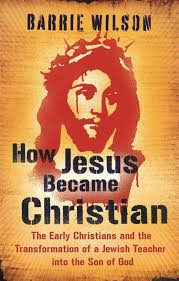
Barrie Wilson, Random House, 2008. Wilson is a Canadian Professor of Religion & History
The main thrust of the book is to suggest that the traditional narratives associated with Christianity need re-examining. That Jesus was a Jew, endorsing the Torah, preaching repentance in anticipation of God’s approaching kingdom on earth. That Jesus believed he would play a key part in both preparation and inauguration of the coming kingdom. Upon his unexpected death, his leadership role was undertaken by his brother James based in Jerusalem. He refers to this as the Jesus Movement which is different and opposed to the Christ movement promoted by Paul. That Pauls heretical notions in time through weight of numbers and influence became the empire’s state religion.
The opening chapter begins with Greek Emperor Antiochus IV Epiphanes trying to eradicate Judaism from Palestine. Hellenization was a threat to Judaism in many respects. Wilson describes how the main factions coped. The Sadducees tried to assimilate, the Pharisees to educate, the Essenes to separate and the Zealots to fight. How could God allow his covenant people to be under the yoke of foreign powers when Isaiah, Zechariah predicted all nations will at some moment in time see Jerusalem as the centre of God’s earthly kingdom.
Most of the factions saw Torah observance as being a catalyst toward divine intervention. Jesus promoted the idea of the Torah being more than outward observances. That instead of killing or committing adultery, a person should control their anger and thoughts. He also taught that the Law would not be done away until God’s kingdom was established and that many would live to see that day.
Wilson promotes evidence to suggest James the Just, the brother of Jesus soon lead the Jesus movement, that he was more than a local Bishop. He highlights the differences between Paul and the Judean church, that tensions between both factions were higher than the smoothing influence of Luke portrays. He investigates the birth of anti-semitism beginning with Pauls influence. He concludes that the historical evidence does not uphold the Catholic notion of Peters authority, neither the assertion of Marys perpetual virginity
I highly recommend Wilsons book, it is very accessible for lay readers. His book follows similar themes as those espoused by Robert Eisenman and James Tabor. These historical scholars lay out for me the most creditable scenario of Jesus’ intentions and legacy. They expose the Christian orthodoxy founded by Paul, promoted by zealous gentiles, legitimised by Constantine and in the last two hundred years has continued to spawn a vast array of churches all based on the historical fallacy of Pauls Christ.